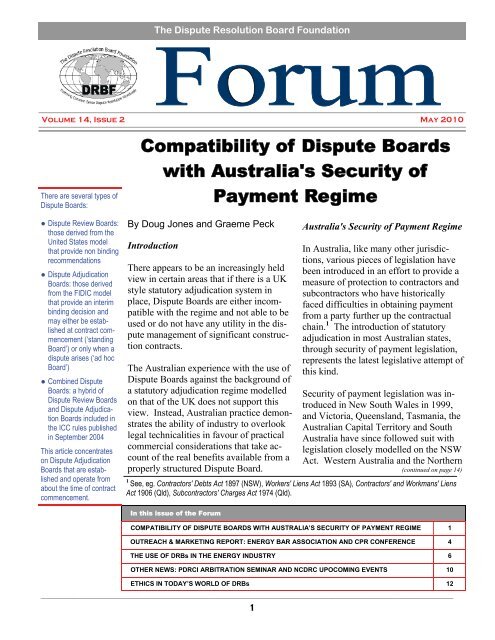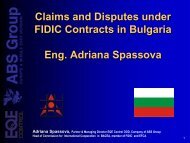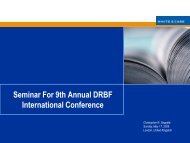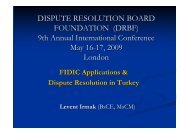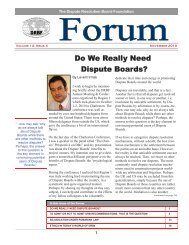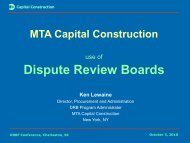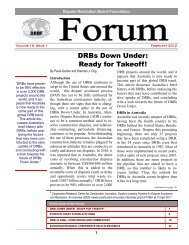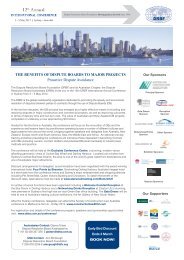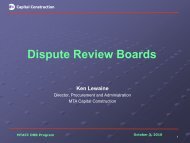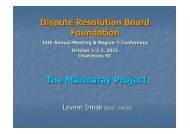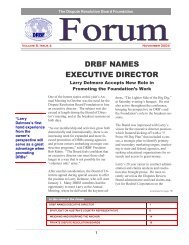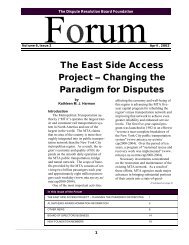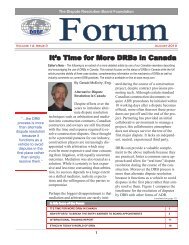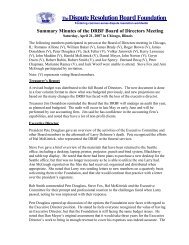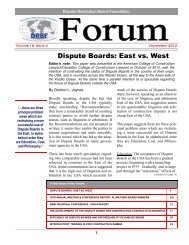Compatibility of Dispute Boards with Australia's Security of ...
Compatibility of Dispute Boards with Australia's Security of ...
Compatibility of Dispute Boards with Australia's Security of ...
Create successful ePaper yourself
Turn your PDF publications into a flip-book with our unique Google optimized e-Paper software.
The <strong>Dispute</strong> Resolution Board Foundation<br />
Volume 14, Issue 2 May 2010<br />
There are several types <strong>of</strong><br />
<strong>Dispute</strong> <strong>Boards</strong>:<br />
● <strong>Dispute</strong> Review <strong>Boards</strong>:<br />
those derived from the<br />
United States model<br />
that provide non binding<br />
recommendations<br />
● <strong>Dispute</strong> Adjudication<br />
<strong>Boards</strong>: those derived<br />
from the FIDIC model<br />
that provide an interim<br />
binding decision and<br />
may either be established<br />
at contract commencement<br />
(‘standing<br />
Board’) or only when a<br />
dispute arises (‘ad hoc<br />
Board’)<br />
● Combined <strong>Dispute</strong><br />
<strong>Boards</strong>: a hybrid <strong>of</strong><br />
<strong>Dispute</strong> Review <strong>Boards</strong><br />
and <strong>Dispute</strong> Adjudication<br />
<strong>Boards</strong> included in<br />
the ICC rules published<br />
in September 2004<br />
This article concentrates<br />
on <strong>Dispute</strong> Adjudication<br />
<strong>Boards</strong> that are established<br />
and operate from<br />
about the time <strong>of</strong> contract<br />
commencement.<br />
<strong>Compatibility</strong> <strong>of</strong> <strong>Dispute</strong> <strong>Boards</strong><br />
<strong>with</strong> <strong>Australia's</strong> <strong>Security</strong> <strong>of</strong><br />
Payment Regime<br />
By Doug Jones and Graeme Peck<br />
Introduction<br />
There appears to be an increasingly held<br />
view in certain areas that if there is a UK<br />
style statutory adjudication system in<br />
place, <strong>Dispute</strong> <strong>Boards</strong> are either incompatible<br />
<strong>with</strong> the regime and not able to be<br />
used or do not have any utility in the dispute<br />
management <strong>of</strong> significant construction<br />
contracts.<br />
The Australian experience <strong>with</strong> the use <strong>of</strong><br />
<strong>Dispute</strong> <strong>Boards</strong> against the background <strong>of</strong><br />
a statutory adjudication regime modelled<br />
on that <strong>of</strong> the UK does not support this<br />
view. Instead, Australian practice demonstrates<br />
the ability <strong>of</strong> industry to overlook<br />
legal technicalities in favour <strong>of</strong> practical<br />
commercial considerations that take account<br />
<strong>of</strong> the real benefits available from a<br />
properly structured <strong>Dispute</strong> Board.<br />
<strong>Australia's</strong> <strong>Security</strong> <strong>of</strong> Payment Regime<br />
In Australia, like many other jurisdictions,<br />
various pieces <strong>of</strong> legislation have<br />
been introduced in an effort to provide a<br />
measure <strong>of</strong> protection to contractors and<br />
subcontractors who have historically<br />
faced difficulties in obtaining payment<br />
from a party further up the contractual<br />
chain. 1 The introduction <strong>of</strong> statutory<br />
adjudication in most Australian states,<br />
through security <strong>of</strong> payment legislation,<br />
represents the latest legislative attempt <strong>of</strong><br />
this kind.<br />
<strong>Security</strong> <strong>of</strong> payment legislation was introduced<br />
in New South Wales in 1999,<br />
and Victoria, Queensland, Tasmania, the<br />
Australian Capital Territory and South<br />
Australia have since followed suit <strong>with</strong><br />
legislation closely modelled on the NSW<br />
Act. Western Australia and the Northern<br />
(continued on page 14)<br />
1 See, eg. Contractors' Debts Act 1897 (NSW), Workers' Liens Act 1893 (SA), Contractors' and Workmans' Liens<br />
Act 1906 (Qld), Subcontractors' Charges Act 1974 (Qld).<br />
In this issue <strong>of</strong> the Forum<br />
COMPATIBILITY OF DISPUTE BOARDS WITH AUSTRALIA’S SECURITY OF PAYMENT REGIME 1<br />
OUTREACH & MARKETING REPORT: ENERGY BAR ASSOCIATION AND CPR CONFERENCE 4<br />
THE USE OF DRBs IN THE ENERGY INDUSTRY 6<br />
OTHER NEWS: PDRCI ARBITRATION SEMINAR AND NCDRC UPOCOMING EVENTS 10<br />
ETHICS IN TODAY’S WORLD OF DRBs 12<br />
———————————————————————————————————————————————————<br />
1
Foundation Forum<br />
I would like in this page to inform all DRBF members <strong>of</strong> the DRBF’s current activities. The<br />
Foundation has been extremely busy on numerous matters ranging from developments, governance<br />
and contact <strong>with</strong> other entities involved or supporting the <strong>Dispute</strong> Board concept, this in<br />
addition to dealing <strong>with</strong> day to day duties.<br />
The 10th DRBF International Conference and workshop will take place in Istanbul from the 12th to the 16th May<br />
2010. The DRBF staff and all the members who have volunteered to run these major events are making the final<br />
arrangements. The registrations are proceeding as planned and once more we will see a gathering <strong>of</strong> people coming<br />
from all over the world, including the far away Australia, all aiming to share experiences, to exchange views, to<br />
identify best practices in the implementation <strong>of</strong> the DRB/DAB, and to “network.” The Foundation is updating the<br />
DRBF introductory brochure; moreover the collection <strong>of</strong> basic data on DRBs has restarted in Region 1 and it will<br />
later be extended to Region 2. The collection <strong>of</strong> data had been suspended in 2004, mainly because <strong>of</strong> the excessive<br />
efforts needed to gather the information. The DRBF, in spite <strong>of</strong> the difficulties, has come once more to the conclusion<br />
that the factual data are essential to convince users, employers and contractors. All members are invited to<br />
support and contribute to this effort.<br />
The DRBF Practice & Procedures Manual was published in January 2007, and the Board has decided to review<br />
and update the Manual; an ad-hoc committee has been formed <strong>with</strong> the programme to produce the up-dated<br />
Manual (<strong>with</strong> an expanded international chapter) <strong>with</strong>in 18 months.<br />
The web site will also be further improved in the coming months to make it even more interactive and user<br />
friendly; the web library will be expanded to <strong>of</strong>fer more documentation to the interested parties and practitioners.<br />
In addition to the above (the list is anyway not exhaustive) all the administrative and standard institutional activities<br />
are proceeding to maintain our Foundation on sound ground and under control.<br />
The implementation <strong>of</strong> the DRBF Ten Year Plan is proceeding and the results are certainly positive. The guidelines<br />
documents which will regulate the relations between the DRBF and the various regions confirming the functions<br />
and the responsibilities are being finalized and are expected to be approved at the Executive Board meeting which<br />
will be held in Istanbul on May 14.<br />
The ballot for the election <strong>of</strong> the Region 2 President Elect has just been concluded and the nomination will be announced<br />
in Istanbul. Now it is time to prepare for the election <strong>of</strong> President Elect for the DRBF Executive Board<br />
and for the Region 1 Board.<br />
I wish also to mention an important duty your <strong>Boards</strong> have: the contacts and relations <strong>with</strong> the major entities<br />
dealing <strong>with</strong> promoting, financing, and contracting, such as the Multilateral Development Banks, FIDIC, ICC,<br />
AAA and several other organizations.<br />
The DRBF logo calls for “Fostering Common Sense <strong>Dispute</strong> Resolution Worldwide.” This does require continuous<br />
efforts by our Foundation. It is essential to maintain and possibly enhance our drive so we call for further members<br />
to volunteer to help the Foundation, please contact the undersigned or info@drb.org.<br />
Last I cannot close this page <strong>with</strong>out thanking all the contributors to the DRBF developments. At all our conferences<br />
we dutifully give credit to the many members who provide their efforts on a voluntary basis and also to the<br />
DRBF permanent full time staff and part time consultant. While there is no way I can list all the numerous volunteers,<br />
to whom goes my and, I am sure, yours heartfelt thanks, but I wish, at least, to record here and give formal<br />
credit to Stephen Fox and Ann McGough for their excellent work.<br />
I am looking forward to meet many <strong>of</strong> you in Istanbul in May and or at the DRBF Annual Meeting and Region 1<br />
Conference in Charleston in October 2010.<br />
Sincerely,<br />
President’s Page<br />
Romano Allione<br />
President, DRBF Executive Board <strong>of</strong> Directors<br />
———————————————————————————————————————————————————<br />
2
DISPUTE<br />
RESOLUTION<br />
BOARD FOUNDATION<br />
FOUNDERS<br />
R. M. Matyas<br />
A.A. Mathews<br />
R.J. Smith<br />
P.E. Sperry<br />
DISPUTE<br />
RESOLUTION<br />
BOARD FOUNDATION<br />
CHARTER MEMBERS<br />
Jack Alkire, Esq.<br />
Romano Allione<br />
Rodney D. Aschenbrenner<br />
Balfour Beatty Construction. Inc.<br />
S.H. Bartholomew, Inc.<br />
John Beyer<br />
Roger Brown<br />
William C. Charvat AIA<br />
Frank Coluccio Construction Co.<br />
Dillingham Construction, Inc.<br />
Raymond J. Dodson, Inc.<br />
James P. Donaldson<br />
Peter M. Douglass, Inc.<br />
Paul Eller & Associates<br />
Frontier-Kemper Constructors. Inc.<br />
Steven M. Goldblatt<br />
Granite Construction, Inc.<br />
Guy F. Atkinson Co. <strong>of</strong> California<br />
Greg M. Harris, Esq.<br />
Paul R. Heather<br />
Impregilo SPA<br />
Gordon L. Jaynes, Esq.<br />
Al Johnson Construction Co.<br />
Keating Associates<br />
Thomas R. Kuesel<br />
Kerry C. Lawrence<br />
Kellogg, LLC<br />
Kiewit Construction Group Inc.<br />
Lemley & Associates, Inc.<br />
Al Mathews Corporation<br />
McNally Tunneling Corporation<br />
Mechanical Contractors Association<br />
<strong>of</strong> Westem Washington<br />
Meyer Construction Consulting<br />
Mole Constructors, Inc.<br />
Nadel Associates<br />
Stephen J. Navin<br />
John W. Nichols, P.E.<br />
Parsons Brinckerh<strong>of</strong>f Quade &<br />
Douglas, Inc.<br />
Pease & Sons<br />
Edward W. Peterson<br />
H. Ray Poulsen Jr.<br />
Quadrant II lnc.<br />
John Reilly Associates<br />
Aurthur B. Rounds<br />
Seifer Yeats & Mills L.L.P.<br />
Shannon & Wilson, Inc.<br />
J.F. Shea Co., Inc.<br />
Patrick A. Sullivan, Esq.<br />
Traylor Brothers, Inc.<br />
Underground Technology Research<br />
Council<br />
Watt, Tieder & H<strong>of</strong>far, L.L.P.<br />
James L. Wilton<br />
Woodward-Clyde Consultants<br />
Ed Zublin AG<br />
Foundation Forum<br />
DRBF Executive Board <strong>of</strong> Directors<br />
The members <strong>of</strong> the Executive Board <strong>of</strong> Directors are:<br />
Romano Allione, President<br />
John C. Norton, President Elect<br />
James J. Brady, Past President<br />
William B. Baker, Secretary<br />
James P. Donaldson, Treasurer<br />
Kerry C. Lawrence, Director and President, Region 1 Board<br />
Volker Jurowich, Director and President, Region 2 Board<br />
Peter M. Douglass, Director, Past President<br />
Harold V. McKittrick, PE, Director, Past President<br />
Gwyn Owen, Director, Past President<br />
Joe Sperry, PE, Founder, Honorary Director<br />
The Executive Committee meets monthly. Recent topics have included:<br />
● Redesign <strong>of</strong> DRBF general information brochure<br />
● Revival <strong>of</strong> Manual Committee, to update Practices & Procedures Manual<br />
● Development <strong>of</strong> regional conferences in Europe, Asia and the U.S.<br />
● Nomination and election procedures for new Board <strong>of</strong> Directors positions<br />
Summaries <strong>of</strong> the Board meetings are available to all DRBF members on the DRBF<br />
web site. To access the Board <strong>of</strong> Directors Meeting Minutes Summary, go to<br />
www.drb.org. Click on the Member Login button, and then click on DRBF Board<br />
<strong>of</strong> Directors.<br />
Executive Board <strong>of</strong> Directors Meeting Schedule:<br />
May 14, 2010 in Istanbul, Turkey<br />
June 18, 2010 by conference call<br />
July 16, 2010 by conference call<br />
Region 1<br />
Board <strong>of</strong> Directors<br />
Kerry Lawrence, President<br />
Roger Brown. President Elect<br />
John C. Norton, Past President<br />
Douglas Holen<br />
Blasdel Reardon<br />
Region 2<br />
Board <strong>of</strong> Directors<br />
Volker Jurowich, President<br />
Nicholas Gould, President Elect<br />
Richard Appuhn<br />
James Perry<br />
Paul Taggart<br />
Questions for the Executive or Regional <strong>Boards</strong> should be addressed to the Board<br />
Presidents, care <strong>of</strong>:<br />
<strong>Dispute</strong> Resolution Board Foundation<br />
19550 International Blvd. So., Suite 314, Seattle, WA 98188<br />
Phone: 206-878-3336 Fax: 206-878-3338 Toll free (US only) 888-523-5208<br />
Email: info@drb.org Web: www.drb.org<br />
———————————————————————————————————————————————————<br />
3
Foundation Forum<br />
Outreach & Marketing Report:<br />
ENERGY BAR ASSOCIATION AND<br />
CPR CONFERENCE<br />
On behalf <strong>of</strong> the DRBF, Kurt Dettman recently participated in a presentation to the Energy<br />
Bar Association in Washington, D.C. and the annual conference <strong>of</strong> the Institute for Conflict<br />
Prevention and Resolution in New York City. The following is his report to the membership.<br />
Energy Bar Association<br />
Presentation<br />
On December 13, 2009, at the <strong>of</strong>fices <strong>of</strong><br />
Morgan Lewis in Washington, D.C., the<br />
ADR Section <strong>of</strong> the Energy Bar Association<br />
(EBA), chaired by Duncan Ross<br />
McKay <strong>of</strong> Northeast Utilities, presented a<br />
web cast entitled “Riding the Wave:<br />
Exploring the use <strong>of</strong> ADR in the new<br />
wave <strong>of</strong> renewable, transmission and<br />
nuclear construction projects.” The<br />
program began <strong>with</strong> a discussion by<br />
Steve Shapiro <strong>of</strong> Certus Strategies on<br />
how owners can navigate the turbulent<br />
waters <strong>of</strong> stakeholder and regulatory<br />
processes to plan, site and permit energy<br />
projects. Ingrid Myers <strong>of</strong> Morgan Lewis<br />
next discussed her transactional and arbitration<br />
experience <strong>with</strong> nuclear project<br />
owners. Kurt Dettman wrapped up the<br />
program by covering the potential use <strong>of</strong><br />
DRBs in the Energy Industry.<br />
The fact <strong>of</strong> the matter is that the energy<br />
industry, at least in the United States, has<br />
not used DRBs. There is some use <strong>of</strong><br />
DBs in the international sector, and Kurt<br />
cited as examples:<br />
●<br />
●<br />
●<br />
●<br />
●<br />
●<br />
Kárahnjúkar Hydro Project, Iceland<br />
Ertan Hydro Plant, China<br />
Ghazi Barotha Hydro Project,<br />
Pakistan<br />
Owen Falls Extension Hydro Project,<br />
Uganda<br />
Nathpa Jhakri Hydro Project, India<br />
EPC Contract for Offshore Wind<br />
Farms<br />
●<br />
ITER Experimental Fusion Reactor,<br />
France (DAB under FIDIC Conditions<br />
<strong>of</strong> Contract, to commence<br />
March 2010)<br />
Ms. Myers, however, advised that most<br />
<strong>of</strong> her U.S. energy clients preferred to<br />
use arbitration and, most interestingly,<br />
preferred to reserve all claims to the end<br />
<strong>of</strong> the project and then arbitrate or negotiate<br />
an omnibus resolution <strong>of</strong> all project<br />
claims. This may seem peculiar to many<br />
<strong>of</strong> us <strong>with</strong> experience in the heavy civil<br />
sector, where there is a general consensus<br />
that resolving disputes in “real time,”<br />
while the project is under way, is always<br />
preferable to the end <strong>of</strong> the contract<br />
claim where memories have faded, people<br />
and documents have disappeared,<br />
claims have grown in size and complexity<br />
<strong>with</strong> the passage <strong>of</strong> time, and the only<br />
discussion is about money. This<br />
prompted Kurt and Duncan to write the<br />
article on page 6, urging in the energy<br />
industry to re-think its approach and explore<br />
the potential use <strong>of</strong> DRBs on energy<br />
projects.<br />
The CPR Conference<br />
The Institute for Conflict Prevention and<br />
Resolution (CPR) is an organization that<br />
promotes and supports the use <strong>of</strong> alternative<br />
dispute resolution by large companies.<br />
Its members include companies<br />
such as Johnson & Johnson, IBM Corporation,<br />
ConocoPhilips, Shell Group,<br />
Northeast Utilities and a number <strong>of</strong> major<br />
national and international law firms. The<br />
———————————————————————————————————————————————————<br />
4
Forum Editor:<br />
Ann McGough<br />
Editorial and<br />
subscription address:<br />
<strong>Dispute</strong> Resolution<br />
Board Foundation,<br />
19550 International<br />
Blvd. So., Suite 314,<br />
Seattle, WA 98188<br />
Phone: 206-878-3336<br />
Fax: 206-878-3338<br />
Toll free (US only)<br />
888-523-5208<br />
amcgough@drb.org<br />
www.drb.org<br />
The Forum is published<br />
quarterly by the <strong>Dispute</strong><br />
Resolution Board<br />
Foundation (DRBF). Any<br />
opinions expressed are<br />
those <strong>of</strong> the authors and<br />
do not necessarily<br />
represent the opinions<br />
<strong>of</strong> the DRBF.<br />
The Forum welcomes<br />
articles on all aspects <strong>of</strong><br />
<strong>Dispute</strong> Resolution<br />
<strong>Boards</strong>, and members<br />
are encouraged to submit<br />
articles or topics to<br />
the DRBF, attn: Editor.<br />
All rights reserved. Any<br />
reproduction or utilization,<br />
except that which<br />
constitutes fair use under<br />
federal copyright<br />
law, is a violation <strong>of</strong> our<br />
copyrights. Written permission<br />
is needed to<br />
reprint more than 300<br />
words.<br />
Please send change <strong>of</strong><br />
address <strong>with</strong> a copy <strong>of</strong> a<br />
recent mailing label six<br />
weeks in advance.<br />
Copyright © 2010<br />
<strong>Dispute</strong> Resolution<br />
Board Foundation<br />
Foundation Forum<br />
day and a half long annual conference<br />
had presentations that included topics<br />
such as “New Business Realities and the<br />
Role <strong>of</strong> ADR: The General Counsels<br />
Weigh In,” “Doing Business in Asia:<br />
ADR Advice From Experts,” “ADR and<br />
Healthcare—from Big Pharma to Patients’<br />
Rights,” and “<strong>Dispute</strong> Prevention<br />
and De-escalation: How to Draft and<br />
Deploy ‘Real time’ Resolution Tools.”<br />
A couple <strong>of</strong> threads were developed that<br />
will be <strong>of</strong> interest to DRBF members.<br />
First, the corporate General Counsels<br />
panel advised that they are using internal<br />
ADR systems to resolve disputes and<br />
claims, and therefore were relying less<br />
on outside counsel to fight things out in<br />
arbitration or litigation. They also advised<br />
that if they needed outside counsel,<br />
one <strong>of</strong> the important criteria was their<br />
approach to resolving issues and claims<br />
cost effectively. The bottom line was<br />
that, like most in these economically<br />
challenges times, these companies are<br />
looking to cut costs, including the use <strong>of</strong><br />
outside legal gladiators.<br />
The second thread was the introduction<br />
<strong>of</strong> dispute prevention, not just dispute<br />
resolution, as a goal <strong>of</strong> CPR and the<br />
practice <strong>of</strong> ADR. To date, it was noted,<br />
CPR (and for that matter, many ADR<br />
providers) have focused on dispute resolution—or<br />
how to resolve claims after<br />
the train wreck has already happened. A<br />
panel led by Jim Groton proposed that<br />
CPR (and other ADR providers) should<br />
focus more on dispute prevention, specifically,<br />
the use <strong>of</strong> third party neutrals to<br />
be available to help parties resolve conflicts,<br />
disputes, and claims in real time.<br />
One <strong>of</strong> the examples Jim cited was the<br />
use <strong>of</strong> DRBs in the construction industry.<br />
Interestingly, the theme <strong>of</strong> dispute prevention<br />
was also echoed by the corporate<br />
counsel panel that also focused on how<br />
to stay out <strong>of</strong> trouble, not just get out <strong>of</strong><br />
trouble when it’s too late.<br />
For DRBF members interested in the<br />
topic <strong>of</strong> the use <strong>of</strong> third party neutrals to<br />
prevent, as well as resolve, disputes, Jim<br />
Groton has published an excellent article<br />
on the topic, entitled “The Standing Neutral:<br />
A ‘Real Time’ Resolution Procedure<br />
That Also Can Prevent <strong>Dispute</strong>s”, CPR<br />
Alternatives, Vol. 27, No. 11 (December<br />
2009).<br />
Kurt Dettman can be reached by<br />
email at kdettman@c-adr.com.<br />
Outreach & Marketing<br />
Committee<br />
As reported in the February ‘10 issue<br />
<strong>of</strong> the Forum newsletter, the DRBF’s<br />
Outreach and Marketing Committee<br />
is working to spread the message <strong>of</strong><br />
the DRB process through a variety <strong>of</strong><br />
avenues, including participation in<br />
industry events such as the ones<br />
reported here.<br />
If you have information about<br />
upcoming events or are active in<br />
organizations that would benefit<br />
from hearing the DRB message,<br />
please contact Region 1 Director and<br />
Regional Representative Coordinator<br />
Blasdel Reardon by email at<br />
reardon@bostonsolv.com.<br />
———————————————————————————————————————————————————<br />
5
By Kurt Dettman and Duncan Ross<br />
MacKay<br />
Introduction<br />
This article explores the potential use <strong>of</strong><br />
<strong>Dispute</strong> Review <strong>Boards</strong> (DRBs) in the<br />
energy industry. To date, DRBs have not<br />
been used widely on energy development<br />
projects in the United States, such as the<br />
development and construction <strong>of</strong> new<br />
fossil fuel power plants, nuclear power<br />
plants, high voltage electric transmission<br />
lines, natural gas pipelines, and renewable<br />
energy sources such as wind farms.<br />
However, <strong>with</strong> new clean and renewable<br />
energy generation projects on the rise,<br />
new high voltage transmission lines being<br />
constructed for reliability and to interconnect<br />
<strong>with</strong> remote renewable generation<br />
sources, and the resurgence <strong>of</strong> complex<br />
nuclear power generation projects, the<br />
authors suggest that the energy industry<br />
in the United States consider using DRBs.<br />
DRBs provide a process for effectively<br />
managing, if not outright avoiding,<br />
potentially high cost, time consuming<br />
and distracting disputes and claims, better<br />
enabling energy project developers to<br />
keep their projects on schedule and on<br />
budget for the benefit <strong>of</strong> their customers<br />
and shareholders.<br />
Background On The Energy Industry<br />
There has been a growing emphasis over<br />
the last several years on a new wave <strong>of</strong><br />
energy development projects, whether to<br />
meet state Renewable Portfolio Standards<br />
(RPS) and Regional Greenhouse Gas<br />
Initiatives (RGGI), in anticipation <strong>of</strong><br />
potential federal carbon legislation and<br />
a national RPS, or to take advantage <strong>of</strong><br />
Foundation Forum<br />
The Use <strong>of</strong> DRBs in the<br />
Energy Industry<br />
federal stimulus funds made available for<br />
renewable and nuclear energy generation<br />
and transmission projects. In November<br />
2009, the U.S. Energy Information Administration<br />
published its Annual Energy<br />
Outlook 2010 that, among other things,<br />
projected energy generation trends and<br />
needs through 2035. Here are a few<br />
observations from the report relating to<br />
the growth <strong>of</strong> renewable generation<br />
during this time frame:<br />
●<br />
●<br />
●<br />
●<br />
Of the estimated 250 gigawatts <strong>of</strong><br />
new capacity added to the grid,<br />
renewables (including hydroelectric)<br />
will account for 93 gigawatts or<br />
about 38% <strong>of</strong> the generation mix.<br />
Non-hydroelectric renewable<br />
sources will meet 41% <strong>of</strong> the total<br />
electricity generation growth<br />
through 2035.<br />
Renewables will gain electricity<br />
market share to 17%; whereas all<br />
other generation sources will decline<br />
in market share.<br />
According to Renewable Energy<br />
Development, wind power has been<br />
growing at a rate <strong>of</strong> over 25% per<br />
year over the last 20 years.<br />
ENERGY INFORMATION ADMINISTRA-<br />
TION / ANNUAL ENERGY OUTLOOK 2010<br />
Additionally, many new renewable projects<br />
are located a substantial distance<br />
from load centers and require new, larger<br />
scale high voltage transmission lines to<br />
interconnect renewable generation <strong>with</strong><br />
load centers <strong>of</strong>ten hundreds <strong>of</strong> miles<br />
away. This accounts in part for the tremendous<br />
growth in the number <strong>of</strong> announced<br />
transmission projects to<br />
———————————————————————————————————————————————————<br />
6
Major<br />
Membership<br />
Contributors<br />
to the DRBF<br />
Platinum<br />
Astaldi<br />
CMC Di Ravenna<br />
Fenwick Elliott LLP<br />
Gwyn Owen<br />
Salini<br />
Sinohydro<br />
Gold<br />
Jim Brady<br />
Roger Brown<br />
Impregilo<br />
Navigant Consulting<br />
Probyn Miers Ltd<br />
Silver<br />
Romano Allione<br />
William B. Baker<br />
Ben Beaumont<br />
Conduril S.A.<br />
James Donaldson<br />
Pete Douglass<br />
Emhemmed A. Ghula<br />
Guy F. Atkinson<br />
Construction<br />
J.F. Shea Co., Inc.<br />
Volker Jurowich<br />
Kenny Construction<br />
Kerry C. Lawrence<br />
M.A.J. (Fred) Matich<br />
McDonough Bolyard Peck<br />
Harold McKittrick P.E.<br />
Daniel F. Meyer<br />
Obayashi<br />
Pegasus Global Holdings<br />
Robert J. Smith P.E., Esq.<br />
Schiavone Construction<br />
Company, LLC<br />
Techno Engineering<br />
Watt Tieder H<strong>of</strong>far &<br />
Fitzgerald<br />
Foundation Forum<br />
interconnect <strong>with</strong> renewable generation<br />
sources throughout the United States.<br />
After years <strong>of</strong> stagnation, new nuclear<br />
plants are once again moving from the<br />
drawing board to the Nuclear Regulatory<br />
Commission (NRC) for approval.<br />
As <strong>of</strong> March, 2010, the NRC has accepted<br />
and docketed applications for 17<br />
new nuclear power plants (several <strong>with</strong><br />
two units). See http://www.nrc.gov/<br />
reactors/new-reactors/new-licensingfiles/expected-new-rx-applications.pdf.<br />
Following are a few additional observations<br />
from the Annual Energy Outlook<br />
2010 relating to nuclear generation:<br />
●<br />
●<br />
●<br />
Nuclear generating capacity will<br />
increase from 100.6 gigawatts in<br />
2008 to 112.9 gigawatts n 2035 (<strong>of</strong><br />
which increase, 8.4 gigawatts <strong>of</strong><br />
capacity come from new plants).<br />
Electricity generated from nuclear<br />
power plants will grow from 806<br />
billion KW Hrs to 898 billion KW<br />
Hrs in 2035.<br />
The NRC currently has 28 applications<br />
for new nuclear power reactors<br />
throughout the U.S.<br />
ENERGY INFORMATION ADMINISTRA-<br />
TION / ANNUAL ENERGY OUTLOOK 2010<br />
Characteristics <strong>of</strong> Energy Projects<br />
Energy projects are becoming increasingly<br />
complex and challenging to<br />
build—the development and construction<br />
process for them is lengthy, they are<br />
costly, and they can be risky from both a<br />
technological and financing standpoint.<br />
For example, renewables projects, particularly<br />
large-scale and <strong>of</strong>f-shore wind,<br />
nuclear power plants, and high voltage<br />
transmission projects <strong>of</strong>ten, if not almost<br />
always, encounter tremendous resistance<br />
from the communities in which they are<br />
to be sited. Additionally, environmental<br />
and other interest groups concerned <strong>with</strong><br />
the visual and physical impacts <strong>of</strong> such<br />
projects on environmentally sensitive<br />
areas and habitat and scenic vistas commonly<br />
make up part <strong>of</strong> the opposition to<br />
such development projects. These<br />
stakeholders <strong>of</strong>ten also influence the siting<br />
and permitting regulatory processes,<br />
generally resulting in an intense,<br />
lengthy, and costly undertaking for the<br />
developer. Developers <strong>of</strong> such projects<br />
cannot be faint <strong>of</strong> heart or short on either<br />
time or financing, and have to look for<br />
ways to navigate through this stakeholder<br />
minefield well before the project<br />
is designed and built. Employing various<br />
ADR techniques, such as facilitation,<br />
community-based conciliation or<br />
mediation, and early and effective stakeholder<br />
outreach can be key<br />
elements to the success <strong>of</strong> an energy<br />
project during its early stages. Often<br />
these processes result in commitments<br />
or limitations <strong>of</strong> operations that will become<br />
contractual requirements that will<br />
constrain the designer and builder during<br />
the design and construction phases.<br />
Even after these new energy projects are<br />
sited and permitted, the projects themselves<br />
are complex to build, requiring a<br />
complicated contractual marriage among<br />
owners, engineers, construction managers,<br />
contractors/subcontractors, and suppliers.<br />
Every party enters into these<br />
contracts <strong>with</strong> the best <strong>of</strong> intentions for a<br />
smooth and harmonious relationship, but<br />
<strong>of</strong>ten disputes arise after the honeymoon<br />
has ended that can threaten to disrupt, if<br />
not outright dissolve, the union. Most<br />
importantly, the parties think constantly<br />
about who pays if the project is over<br />
budget or late--the owner the contractor<br />
the subcontractors the suppliers<br />
the customers<br />
Another factor that makes the energy<br />
industry somewhat unique is the degree<br />
to which energy companies are heavily<br />
———————————————————————————————————————————————————<br />
7
egulated, <strong>with</strong> their revenues and costs<br />
subject to scrutiny, after the fact,<br />
through the rate making process. Thus,<br />
energy companies not only must manage<br />
the bottom line on project costs, but<br />
also need to be able to justify those<br />
costs later in order to re-capture them in<br />
rates.<br />
As <strong>with</strong> any complex, costly and<br />
lengthy project, disputes during the<br />
construction phase are commonplace.<br />
When disputes arise and the contractual<br />
and legal jousting begins, the combatants<br />
<strong>of</strong>ten cannot readily conceive <strong>of</strong>,<br />
let alone agree to, an alternative to traditional<br />
litigation to resolve their disputes.<br />
Thus, the question is whether<br />
adequate processes have been developed<br />
and put in place to manage effectively<br />
those disputes as they occur so<br />
that critical project relationships can be<br />
maintained, schedules met, and costs<br />
kept in check as the disputes play out.<br />
During the contracting phase <strong>of</strong> any<br />
development project, there is a need for<br />
focused and deliberate attention to how<br />
disputes during the project can be<br />
avoided, managed, and resolved. In<br />
many energy projects, the parties seem<br />
to rely exclusively on the adjudicatory<br />
process <strong>of</strong> either arbitration or litigation<br />
in the court system when disputes arise.<br />
Thus, despite the best planning, disputes,<br />
change order requests, and<br />
claims <strong>of</strong>ten pile up in a project’s lifecycle<br />
and become one <strong>of</strong> the last boxes<br />
on the punch list to be checked before<br />
the project can be closed out and put<br />
into commercial operation.<br />
Energy developers should consider incorporating<br />
other forms <strong>of</strong> ADR during<br />
the project’s lifecycle to avoid the<br />
“bottlenecking” effect <strong>of</strong> adjudication<br />
at the conclusion <strong>of</strong> construction. Some<br />
energy project developers employ a<br />
stepped approach to dispute resolution<br />
that includes mandatory negotiation and<br />
Foundation Forum<br />
mediation before resorting to arbitration<br />
or litigation. This approach enhances the<br />
ability <strong>of</strong> developers to resolve disputes<br />
earlier in the process and enables the<br />
critical relationships to continue working<br />
toward the collective goal <strong>of</strong> timely and<br />
on-budget project completion. We suggest,<br />
though, that developers in this new<br />
wave <strong>of</strong> energy project development consider<br />
employing a standing neutral, such<br />
as a DRB, to more effectively and efficiently<br />
eliminate disputes and claims during<br />
the course <strong>of</strong> the project rather than<br />
waiting until the end <strong>of</strong> the project to<br />
“settle up.”<br />
The Advantages <strong>of</strong> Using DRBs for<br />
Energy Projects<br />
Power plant and transmission line projects<br />
share some common features <strong>with</strong><br />
large civil construction projects, on<br />
which DRBs have been used successfully<br />
for years:<br />
●<br />
●<br />
●<br />
●<br />
●<br />
Lengthy projects (permitting to<br />
commercial operation can take<br />
many years).<br />
Multiple parties (owner, designer,<br />
engineer, CM, GC, Subs, and<br />
Suppliers).<br />
Complex engineering and<br />
coordination challenges.<br />
Cost/schedule pressures to get<br />
to commercial operation.<br />
Involvement <strong>of</strong> outside stakeholders<br />
(funding entities,<br />
regulators, customers).<br />
With these factors in mind, what are the<br />
advantages <strong>of</strong> using a DRB as a way to<br />
prevent and resolve disputes<br />
●<br />
DRB members are respected industry<br />
pr<strong>of</strong>essionals and knowledgeable<br />
about the type <strong>of</strong> project being built.<br />
———————————————————————————————————————————————————<br />
8
DRBF Country Representatives<br />
Australia & New Zealand<br />
Graeme Maxwell Peck<br />
Austria<br />
Marcus Theil<br />
Belgium<br />
William Buyse<br />
Brazil<br />
Gilberto José Vaz<br />
Canada<br />
Donald L. Marston<br />
China<br />
Hongwei Zhao<br />
Ethiopia<br />
Michael Gunta<br />
France<br />
Marc Frilet<br />
Germany<br />
Dr. Helmut Koentges<br />
Greece<br />
Rohan Shorland<br />
Iceland<br />
Páll Ólafsson<br />
India<br />
Shri K. Subrahmanian<br />
Ireland<br />
Dr. Nael G. Bunni<br />
Italy<br />
Andrea Del Grosso<br />
Japan<br />
Toshihiko Omoto<br />
Libya<br />
Emhemmed Ghula<br />
Malaysia<br />
Sundra Rajoo<br />
Mauritius<br />
Kailash Dabeesingh<br />
Mexico<br />
Dr. Lic. Herfried Wöss<br />
Netherlands<br />
Lyda Bier<br />
Nepal<br />
Sanjeev Kiorala<br />
Pakistan<br />
Khalil-Ur-Rehman Khan<br />
Phillippines<br />
Salvador P. Castro, Jr.<br />
Poland<br />
Krzyszt<strong>of</strong> Woznicki<br />
Portugal<br />
Maria de Conceição Oliveira<br />
Qatar<br />
Wayne Clark<br />
Romania<br />
Alina Oprea<br />
Singapore<br />
Christopher Redfearn<br />
Southern Africa<br />
Andrew L. Griffiths<br />
Sri Lanka<br />
Tilak Kolonne<br />
Spain<br />
Pablo Laorden<br />
Switzerland<br />
Michel Nardin<br />
Thailand<br />
Victor James Smith<br />
Turkey<br />
Levent Irmak<br />
United Arab Emirates<br />
Frank Leech<br />
United Kingdom<br />
Murray Armes<br />
●<br />
●<br />
●<br />
●<br />
●<br />
●<br />
●<br />
●<br />
●<br />
●<br />
Foundation Forum<br />
DRB members are neutral and objective,<br />
and are charged <strong>with</strong> making<br />
recommendations based on the facts<br />
and the contract documents.<br />
The DRB process starts at the<br />
beginning <strong>of</strong> the project and is in<br />
place throughout the lifecycle <strong>of</strong> the<br />
project, so it is available as and<br />
when needed.<br />
As a result <strong>of</strong> its involvement in the<br />
project the DRB becomes familiar<br />
<strong>with</strong> the players, the issues and the<br />
project’s history.<br />
The periodic DRB meetings require<br />
open communication among all<br />
project participants that helps avoid<br />
issues becoming disputes or claims.<br />
The DRB meetings promote the<br />
periodic involvement <strong>of</strong> all key<br />
project stakeholders, including<br />
senior decision makers.<br />
The hearing process is contemporaneous<br />
<strong>with</strong> the dispute and is thorough,<br />
but focused—it is, therefore,<br />
much less expensive than arbitration<br />
or litigation.<br />
The relatively informal hearing<br />
process on claims permits the parties<br />
themselves (as opposed to their lawyers)<br />
an opportunity to present their<br />
sides <strong>of</strong> the dispute.<br />
The findings and recommendations<br />
are detailed so that the parties have<br />
the benefit <strong>of</strong> the DRB’s evaluation<br />
<strong>of</strong> the dispute in all <strong>of</strong> its aspects<br />
(both factual and legal).<br />
The findings and recommendations<br />
are non-binding, leaving ultimate<br />
control <strong>of</strong> the outcome to the parties.<br />
The DRB findings and recommendations<br />
give the parties a basis on<br />
which to assess risk exposure and<br />
make better informed business judgments<br />
that can be used to justify decisions<br />
later to regulators and rate<br />
commissions.<br />
Conclusion<br />
The successful use <strong>of</strong> DRBs to prevent<br />
and resolve disputes is well-established<br />
on complex heavy civil and building projects.<br />
The coming multi-billion dollar<br />
wave <strong>of</strong> renewables projects, new nuclear<br />
projects and large high voltage<br />
transmission projects in the energy industry<br />
share many <strong>of</strong> the same characteristics<br />
as these projects—costly, lengthy,<br />
complex, high risk and a veritable breeding<br />
ground for disputes. As the Energy<br />
Industry considers how to effectively,<br />
efficiently and timely manage and resolve<br />
disputes on these projects, owners<br />
should consider transplanting the success<br />
<strong>of</strong> DRBs to the energy projects <strong>of</strong> the<br />
future.□<br />
About the Authors:<br />
Kurt Dettman is the principal <strong>of</strong> Constructive<br />
<strong>Dispute</strong> Resolutions, an ADR<br />
practice specializing in all aspects <strong>of</strong><br />
dispute avoidance and resolution in the<br />
construction industry, <strong>with</strong> an emphasis<br />
on megaprojects. He has written extensively<br />
about DRBs and conducts trainings<br />
on DRB practice and administration.<br />
He can be reached by email at<br />
kdettman@c-adr.com.<br />
Duncan Ross MacKay is Deputy General<br />
Counsel for Northeast Utilities (NU).<br />
NU operates New England’s largest<br />
energy delivery system <strong>with</strong> operations<br />
in Connecticut, New Hampshire and<br />
Western Massachusetts covering 11,345<br />
square miles. Member companies in<br />
NU’s transmission business include<br />
Connecticut Light and Power (CL&P),<br />
Public Service <strong>of</strong> New Hampshire<br />
(PSNH), and Western Massachusetts<br />
Electric Company. He is responsible for<br />
the team <strong>of</strong> lawyers at NU who evaluate<br />
and resolve claims involving NU projects<br />
and can be reached by email at<br />
mackadr@nu.com.<br />
———————————————————————————————————————————————————<br />
9
Foundation Forum<br />
Other News<br />
Arbitration Training Seminar<br />
Philippine <strong>Dispute</strong> Resolution Center,<br />
Inc. (PDRCI) has been a partner <strong>of</strong><br />
DRBF Philippines in promoting DABs<br />
and DBs in the Philippines. PDRCI will<br />
be conducting a seminar on Arbitration<br />
on the 26th to 29th <strong>of</strong> May, “The Law<br />
and Practice <strong>of</strong> Commercial Arbitration”<br />
at the Linden Suites in Pasig City.<br />
The 4-day seminar aims to teach law<br />
practitioners and other pr<strong>of</strong>essionals the<br />
law and practice <strong>of</strong> commercial arbitration.<br />
The seminar will discuss the<br />
applicable laws governing commercial<br />
arbitration and will guide the participants<br />
in a step-by-step fashion through the entire<br />
arbitration process, starting from the<br />
drafting <strong>of</strong> the arbitration agreement,<br />
preparation <strong>of</strong> the arbitration claims and<br />
defenses and selection and appointment<br />
<strong>of</strong> the arbitrators, to the conduct <strong>of</strong> the<br />
arbitration hearings and the recognition,<br />
enforcement and challenge <strong>of</strong> arbitral<br />
awards.<br />
The seminar will also discuss in depth<br />
the relevant laws on arbitration, including<br />
the ADR Act <strong>of</strong> 2004, the<br />
Arbitration Law and the UNCITRAL<br />
Model Law on International Commercial<br />
Arbitration. It will also cover recent developments<br />
in commercial arbitration,<br />
including the Special ADR Rules <strong>of</strong><br />
Court and the Implementing Rules and<br />
Regulations <strong>of</strong> the ADR Act (DOJ Department<br />
Circular No. 98), which took<br />
effect in October 2009 and December<br />
2009, respectively.<br />
At the end <strong>of</strong> the seminar, the participants<br />
are expected to have acquired a<br />
working knowledge <strong>of</strong> the arbitration<br />
process both from the perspective <strong>of</strong> an<br />
arbitrator as well as <strong>of</strong> a lawyer representing<br />
parties in arbitration proceedings.<br />
More information and registration forms<br />
are available at the organization’s website,<br />
www.pdrci.org.<br />
NCDRC Upcoming Events<br />
The DRBF is a member <strong>of</strong> the National<br />
Construction <strong>Dispute</strong> Resolution<br />
Committee (NCDRC) <strong>of</strong> the American<br />
Arbitration Association (AAA).<br />
DRBF members may be interested in the<br />
following NCDRC meeting dates for<br />
2010. If a DRBF member has an idea for<br />
the NCDRC, please contact Region 1<br />
Board President Kerry Lawrence.<br />
2010 Mid-Year Meeting<br />
Thursday, June 3, 2010<br />
9:30AM to 3PM<br />
Washington, DC.<br />
Seyfarth Shaw LLP<br />
975 F Street, NW Washington, DC<br />
2010 Annual Meeting<br />
Thursday, December 9, 2010<br />
9:30AM to 3PM<br />
Washington, DC, Site: TBD<br />
2011 Mid-Year Meeting<br />
Thursday, June 2, 2011<br />
9:30AM to 3PM<br />
Washington, DC, Site: TBD<br />
———————————————————————————————————————————————————<br />
10
Foundation Forum<br />
DRBF Event Calendar<br />
The <strong>Dispute</strong> Resolution Board Foundation hosts meetings and conferences<br />
throughout the year, as well as training workshops. Some workshops are private,<br />
in-house training for agencies using <strong>Dispute</strong> <strong>Boards</strong>, and others are stand alone or<br />
held in conjunction <strong>with</strong> a conference. New events are added as the dates are<br />
confirmed; visit the DRBF website for the most recent schedule.<br />
Training Workshop:<br />
“The Allocation <strong>of</strong> Risk and<br />
The Duties and Responsibilities <strong>of</strong> the<br />
<strong>Dispute</strong> Adjudication Board Under FIDIC Contract Conditions”<br />
May 12-13, 2010<br />
Istanbul, Turkey<br />
10th Annual International Conference:<br />
“Construction <strong>Dispute</strong>s at the Crossroads”<br />
May 14-16, 2010<br />
Istanbul, Turkey<br />
Northwest Regional Conference & Chairing Workshop<br />
June 4, 2010<br />
Seattle, WA USA<br />
2nd Bucharest DRBF Regional Conference<br />
“Understanding <strong>Dispute</strong> <strong>Boards</strong>: A training workshop and conference<br />
introducing and examining the effective use <strong>of</strong> <strong>Dispute</strong> <strong>Boards</strong><br />
in FIDIC Contracts”<br />
June 9-11, 2010<br />
Bucharest, Romania<br />
International FIDIC Contracts Training Course<br />
“The Responsibilities and Duties <strong>of</strong> <strong>Dispute</strong><br />
Adjudicators and Parties to <strong>Dispute</strong>s”<br />
June 14-15, 2010<br />
Vienna, Austria<br />
DRBF 14th Annual Meeting and<br />
Region 1 Conference<br />
October 1-3, 2010<br />
Charleston, SC USA<br />
Visit www.drb.org for details!<br />
———————————————————————————————————————————————————<br />
11
By Jim Phillips Ph. D.<br />
The question I posed in<br />
the February issue <strong>of</strong> the<br />
Forum was how should<br />
the DRB respond to a<br />
request from the contractor<br />
to the Chair that the<br />
Board resign because,<br />
after several Recommendations from the<br />
DRB that neither party accepted, the contractor<br />
has decided that the DRB process is<br />
“a waste <strong>of</strong> time.” The question also assumes<br />
that the owner is in favor <strong>of</strong> keeping<br />
the DRB process in place during the project.<br />
This issue is a tough one primarily because<br />
it is not addressed directly by the language<br />
<strong>of</strong> the DRBF’s Code <strong>of</strong> Ethics. The first<br />
point that should be made is that immediately<br />
after receiving the contractor’s request,<br />
the Chair should so advise her/his fellow<br />
Board members in order that all members<br />
can discuss a course <strong>of</strong> action prior to the<br />
next regularly scheduled DRB meeting.<br />
Obviously the Board should take the request<br />
seriously rather than just the contractor’s<br />
dissatisfaction <strong>with</strong> the DRB’s Recommendations<br />
that neither she nor the owner has<br />
accepted.<br />
Assuming that the contractor’s request is not<br />
based upon alleged misconduct by the DRB<br />
or a member, such as a failure to disclose a<br />
conflict <strong>of</strong> interest or an ex parte communication,<br />
the DRB might want to review its<br />
activity on the project to determine if it can<br />
identify any other reason for the contractor’s<br />
request. For example, maybe the Board did<br />
not provide adequate attention in its Recommendations<br />
to the contractor’s positions, or<br />
failed to fully explain the logic <strong>of</strong> its rationale<br />
that provided the bases for is Recommendations.<br />
Often a party may perceive<br />
that the DRB has not fully given the attention<br />
to its positions in the hearing process,<br />
Foundation Forum<br />
Ethics in Today’s World <strong>of</strong> DRBs:<br />
Contractor Requests DRB Resignations After<br />
Several DRB Hearings and Recommendations<br />
each to make their presentations, or in<br />
some other way, indicated that the playing<br />
field is not level. Perceptions <strong>of</strong> unfairness<br />
<strong>of</strong>ten begin <strong>with</strong> very small or minor<br />
actions by a Board that are interpreted the<br />
wrong way, which begins a growing perception<br />
that the DRB is not treating each<br />
party equally, which calls the entire process<br />
into question. Canon 4 <strong>of</strong> the Code <strong>of</strong><br />
Ethics commands that the DRB conduct<br />
meetings in an “impartial manner.”<br />
Sometimes, by cutting <strong>of</strong>f testimony, or<br />
failing to fully consider a document presented<br />
in the hearing, either party may<br />
believe that the DRB is not fully engaged<br />
in the process, which can lead to perceptions<br />
<strong>of</strong> bias or unfairness in the process.<br />
Even if the Board in this question can<br />
identify an action that prompted the contractor’s<br />
request for the Board’s resignation,<br />
it may be the contractor’s frustration<br />
has been percolating for such a long time<br />
that any attempts to correct the appearance<br />
<strong>of</strong> unfairness will fall on deaf ears.<br />
However, the Board should be prepared to<br />
address these concerns at the next regularly<br />
scheduled meeting. Better yet, the<br />
Board should, in discussing the request at<br />
the meeting, inquire as to the basis for the<br />
contractor’s request for its resignation to<br />
determine if there are misperceptions<br />
about a previous activity that might be<br />
corrected or fully aired and perhaps resolved.<br />
It should be noted that the Foundation’s<br />
Practices and Procedures manual does<br />
address the issue <strong>of</strong> resignation in Section<br />
3.8. This section initially states that most<br />
Third Party Agreements provide that a<br />
member, or the entire DRB, may be terminated<br />
<strong>with</strong> the agreement <strong>of</strong> both contracting<br />
parties. In our case, the owner has<br />
expressed his interest in having the DRB<br />
continue, so our issue is more complex.<br />
either by giving ample and equal time for<br />
———————————————————————————————————————————————————<br />
12
Ethics Commentary<br />
or Question<br />
Please contact:<br />
Jim Phillips<br />
DRBF Ethics<br />
Committee Chair<br />
P: 804-289-8192<br />
E: jphillip<br />
@richmond.edu<br />
Foundation Forum<br />
This section also states that one <strong>of</strong> the parties<br />
may have become reluctant to refer disputes<br />
to the DRB because “…they have lost<br />
faith in the DRB’s impartiality.” This recalls<br />
my comments earlier about the Canon<br />
4 requirement for the Board to remain impartial.<br />
Section 3.8 goes on to state that “…<br />
[i]f the Chair senses that this is a possibility,<br />
he or she should investigate the situation<br />
and do everything possible to address it ,<br />
including discussion and correspondence<br />
<strong>with</strong> both parties to understand their concerns<br />
and points <strong>of</strong> view.”<br />
Section 3.8 also provides for a framework<br />
for the DRB to make a decision regarding<br />
resignation. If the DRB decides that one<br />
member is an “obstacle” to the dispute resolution<br />
process, then that member in question<br />
should resign. Again, in our question under<br />
discussion, the owner has indicated a desire<br />
that the DRB continue, so the owner in our<br />
example would have to agree after a full<br />
discussion <strong>of</strong> the facts and circumstances. If<br />
the owner continues not to agree to a resignation,<br />
then according to this section, the<br />
DRB must carefully consider the best course<br />
for the benefit <strong>of</strong> the project.<br />
Section 3.8 also provides that if none <strong>of</strong><br />
the Board has violated any principles <strong>of</strong> impartiality,<br />
and if one or both <strong>of</strong> the parties<br />
no longer trust the DRB to be impartial, the<br />
DRB has lost much <strong>of</strong> its value and “…<br />
replacement <strong>of</strong> the entire DRB <strong>with</strong> new<br />
Board members should be considered.”<br />
This section goes on to state that the entire<br />
Board should <strong>of</strong>fer its resignation and it is<br />
then up to the parties to accept it. It goes on<br />
to provide “…[i]n the event that the parties<br />
disagree as to whether the DRB should be<br />
replaced, then the resignation is deemed not<br />
to be accepted.”<br />
This language suggests that if one party<br />
wants to keep the DRB, as in our case, the<br />
resignation should not be accepted. Obviously,<br />
this is a very complex question <strong>with</strong><br />
many ramifications for the project. In our<br />
case, the contractor said that she thought the<br />
DRB process was a waste <strong>of</strong> time and<br />
money. This might suggest that the contractor<br />
is not happy <strong>with</strong> the Board’s<br />
Recommendations, rather than a belief that<br />
the DRB is no longer being impartial. Section<br />
3.8 suggests that resignation for this<br />
reason is not a good idea because the parties<br />
could then have the belief that they might<br />
“shop” for favorable Board members.<br />
The issue <strong>of</strong> the DRB resignation, as I have<br />
suggested here, is a complex and difficult<br />
one, on which there is precious little guidance<br />
in the Canons <strong>of</strong> Ethics. If the DRB’s<br />
resignation is accepted by both parties, the<br />
effective date should be scheduled so that a<br />
new Board is in place simultaneous <strong>with</strong> the<br />
previous DRB’s termination. In any event,<br />
a resignation by the full DRB, in my opinion,<br />
should only occur when all parties and<br />
the DEB agree that it has lost its effectiveness<br />
as impartial decision makers. The<br />
important thing is to have an open and honest<br />
discussion about a Board resignation so<br />
that the parties can continue to have confidence<br />
in the process, no matter who the<br />
individual Board members are.<br />
Finally, the specific contract DRB Specification<br />
should be looked to prior to the time<br />
that any resignation is executed. Some<br />
specifications and third party agreements<br />
may not require both parties to accept a<br />
member or the entire DRB’s resignation.<br />
Obviously, each case should be analyzed on<br />
a case by case according to the specific contract<br />
language. I will appreciate any <strong>of</strong> the<br />
readers’ comments on this important topic.<br />
NEXT ETHICS CHALLENGE<br />
Assume you are the Chair <strong>of</strong> a DRB that<br />
has been operating on a project for quite<br />
some time. You are chairing a formal hearing<br />
<strong>of</strong> a dispute brought to the Board by the<br />
contractor for a Recommendation. The<br />
Rules <strong>of</strong> Procedure by which the hearings<br />
are conducted, and to which both parties<br />
have agreed, provide that no dispute can be<br />
heard <strong>with</strong>out first being briefed in position<br />
papers and responded to by the other party.<br />
Assume that in the middle <strong>of</strong> the hearing,<br />
the owner alleges that there is a dispute being<br />
introduced for the first time at the hearing<br />
for which there has been no briefing in<br />
the position papers.<br />
What should you do<br />
———————————————————————————————————————————————————<br />
13
(continued from page 1)<br />
Territory have also introduced similarlegislation<br />
2 , although theirs are not as<br />
closely modelled on the NSW Act as the<br />
Acts <strong>of</strong> the other states and territories<br />
are.<br />
In contrast to earlier legislation which<br />
focussed primarily on insolvency risk,<br />
but did little to streamline enforcement,<br />
the current legislation focuses on trying<br />
to ease the contractor’s difficulty in getting<br />
paid by providing a quick enforcement<br />
process in the form <strong>of</strong> a statutory<br />
progress payment regime, backed by<br />
adjudication. 3 It addresses the insolvency<br />
risk more indirectly, in that by<br />
use <strong>of</strong> the legislation a contractor can<br />
(hopefully) prevent a situation where it<br />
has not been paid for months or years by<br />
the time the owner becomes insolvent.<br />
Foundation Forum<br />
Importantly, parties cannot use the contract<br />
to exclude the operation <strong>of</strong> the Act. 4<br />
Though because the matter being adjudicated<br />
upon is the contractor’s right to<br />
progress payments, not final liabilities,<br />
any injustice that may be done in the adjudication<br />
can theoretically be corrected<br />
in the determination <strong>of</strong> those final liabilities<br />
in arbitration or litigation. Arguably<br />
all that really happens is that payment<br />
risk gets transferred to the upstream<br />
party until such time as the courts or<br />
arbitrators render a final determination.<br />
Under the NSW Act, if a construction<br />
contract makes provision for progress<br />
payments, the legislation effectively<br />
turns the contractor’s contractual entitlement<br />
into a statutory one. 5 If the contract<br />
does not make such provision, then certain<br />
default provisions take effect so that<br />
the contractor is entitled to monthly progress<br />
payments. 6 Armed <strong>with</strong> this statutory<br />
entitlement to progress payments,<br />
the contractor may make a “payment<br />
claim” setting out an amount it claims to<br />
be due. 7 The owner must respond <strong>with</strong> a<br />
“payment schedule,” setting out the<br />
amount the owner believes to be due and<br />
giving reasons for any difference from<br />
the payment claim. 8<br />
Where the amount shown in the schedule<br />
is less than the amount claimed (or if the<br />
owner fails to pay), the contractor may<br />
choose to apply for adjudication <strong>of</strong> the<br />
matter. 9 The adjudication application<br />
must be made to an authorised nominating<br />
authority chosen by the contractor 10 ,<br />
2 Building and Construction Industry <strong>Security</strong> <strong>of</strong> Payment Act 1999 (NSW) ("NSW Act"); Building and Constructions<br />
Industry <strong>Security</strong> <strong>of</strong> Payment Act 2002 (Vic) ("Victorian Act"); Building and Construction Industry Payments<br />
Act 2004 (Qld) ("Queensland Act"); Building and Construction Industry <strong>Security</strong> <strong>of</strong> Payment Act 2009 (Tas)<br />
("Tasmanian Act"); Building and Construction Industry (<strong>Security</strong> <strong>of</strong> Payment) Act 2009 (ACT) ("ACT Act") (this<br />
Act does not commence until 1 July 2010); Building and Construction Industry <strong>Security</strong> <strong>of</strong> Payment Act 2009<br />
(SA) ("SA Act") (as at February 2010, this Act had no commencement date); Construction Contracts Act 2004<br />
(WA) ("WA Act") and Construction Contracts (<strong>Security</strong> <strong>of</strong> Payment) Act 2004 (NT) ("NT Act") respectively.<br />
3 For simplicity <strong>of</strong> expression this section refers to the operation <strong>of</strong> the legislation in the context <strong>of</strong> a contractor<br />
and an owner. It should, however, be noted that the Acts apply equally to owner/contractor and contractor/<br />
subcontractor contracts.<br />
4 This provision is common to the security <strong>of</strong> payment legislation in all states and territories: NSW Act s 34, Victorian<br />
Act s 48, Queensland Act s 99, WA Act s 53, NT Act s 10, ACT Act s 42, SA Act s 33, Tasmanian Act s 11.<br />
5 NSW Act s 11(1) (a).<br />
6 NSW Act s 11(1) (b).<br />
7 NSW Act s 13.<br />
8 NSW Act s 14.<br />
9 NSW Act s 17(1).<br />
10 NSW Act s 17(3) (b). With the exception <strong>of</strong> the WA Act and NT Act, which allow parties to select a adjudicator<br />
by agreement, this provision is common to the security <strong>of</strong> payment legislation in all other states and territories:<br />
WA Act s 26(1)(c), NT Act s 28(1)(c), Victoria Act s 18(3)(b), Queensland Act s 21(3)(b), ACT Act s 19, SA Act s<br />
17(3)(b), Tasmanian Act s 21(1).<br />
———————————————————————————————————————————————————<br />
14
Foundation Forum<br />
which then refers the application to an<br />
eligible adjudicator. 11 While procedure<br />
is largely at the discretion <strong>of</strong> the adjudicator,<br />
12 a determination must be made<br />
<strong>with</strong>in 10 business days <strong>of</strong> the adjudicator’s<br />
appointment, unless the parties<br />
agree otherwise. 13<br />
If the owner does not pay the amount<br />
due under the adjudicator’s determination,<br />
the contractor may give notice <strong>of</strong> an<br />
intention to suspend work, and may also<br />
obtain an “adjudication certificate”<br />
which can be filed in court as a judgment<br />
for a debt.<br />
Is There a Place for <strong>Dispute</strong> <strong>Boards</strong> in<br />
a <strong>Security</strong> <strong>of</strong> Payment Regime<br />
A <strong>Dispute</strong> Board is a panel <strong>of</strong> (typically)<br />
three experts, existing from the outset <strong>of</strong><br />
the project, which meets together at<br />
regular intervals throughout the course<br />
<strong>of</strong> the project so as to develop a familiarity<br />
<strong>with</strong> it, and which hears and resolves<br />
disputes both quickly and cheaply as<br />
they arise on site. The key difference to<br />
note between a <strong>Dispute</strong> Board and statutory<br />
adjudication under the security <strong>of</strong><br />
payment regime, for the purposes <strong>of</strong> this<br />
discussion, is that a <strong>Dispute</strong> Board is<br />
contractually based and the panel <strong>of</strong> experts<br />
are usually chosen by the parties,<br />
while the adjudicator under the statutory<br />
regime is chosen by an authorised nominating<br />
authority. Both processes, however,<br />
are intended to be binding on the<br />
parties in the interim.<br />
How then do these two dispute resolution<br />
processes operate when it comes to<br />
a payment dispute<br />
The first matter that must be considered<br />
is whether a <strong>Dispute</strong> Board can act as the<br />
adjudicator under the security <strong>of</strong> payment<br />
regime. The legislation requires<br />
that an adjudication application be made<br />
to an authorised nominating authority,<br />
which refers the dispute to an eligible<br />
adjudicator. This leaves no room for the<br />
parties to select their own adjudicator. It<br />
is therefore not possible for a <strong>Dispute</strong><br />
Board, the members <strong>of</strong> which have been<br />
selected by the parties, to make a determination<br />
under the Act. 14<br />
Given a <strong>Dispute</strong> Board cannot act as an<br />
adjudicator under the Act, the second<br />
question is whether an interim binding<br />
determination on a payment dispute by a<br />
<strong>Dispute</strong> Board can replace adjudication<br />
pursuant to the Act. The Act explicitly<br />
states that parties cannot exclude its operation<br />
through contractual provisions.<br />
Thus a purportedly binding decision on a<br />
payment dispute by a <strong>Dispute</strong> Board<br />
cannot stand because the contractor retains<br />
the right to have that same payment<br />
dispute decided by an adjudicator under<br />
the statutory adjudication regime.<br />
Does this make <strong>Dispute</strong> <strong>Boards</strong> redundant<br />
as far as payment disputes are concerned<br />
In theory, yes. There seems to<br />
be little utility in establishing a <strong>Dispute</strong><br />
Board if its decisions on payment disputes<br />
are effectively voidable upon<br />
application for adjudication.<br />
In practice, however, experience is<br />
showing that where the parties have chosen<br />
to establish a <strong>Dispute</strong> Board they are<br />
preferring to allow the <strong>Dispute</strong> Board to<br />
make final and binding decisions on all<br />
11 NSW Act s 17(6).<br />
12 See NSW Act s 21.<br />
13 NSW Act s 21(3).<br />
14 Note that this differs from the position under the United Kingdom statutory adjudication regime, which does<br />
not stipulate how the adjudicator is to be selected, thereby leaving it open for the parties to appoint the <strong>Dispute</strong><br />
Board as the adjudicator where the UK statutory scheme applies: Housing Grants, Construction and Regeneration<br />
Act 1996 108.<br />
———————————————————————————————————————————————————<br />
15
disputes under the contract, despite the<br />
apparent incompatibility <strong>with</strong> security <strong>of</strong><br />
payment legislation. Since 2003, approximately<br />
AU$5 billion actual construction<br />
turnover has been completed or<br />
is well underway <strong>with</strong> contracts utilising<br />
various forms <strong>of</strong> <strong>Dispute</strong> <strong>Boards</strong>. The<br />
type <strong>of</strong> contract has ranged across the<br />
full spectrum <strong>of</strong> Construct Only, Design<br />
& Construct, Early Contractor Involvement,<br />
Design, Construct & Maintain, Design,<br />
Construct, Operate & Maintain, and<br />
Hybrid Alliances. There have been three<br />
known disputes formally referred to <strong>Dispute</strong><br />
<strong>Boards</strong> since 2003. None have gone<br />
beyond the <strong>Dispute</strong> Board and there has<br />
been no suggestion that the parties involved<br />
in these contracts considered an<br />
adjudication application.<br />
This apparent preference for <strong>Dispute</strong><br />
<strong>Boards</strong> can be attributed to certain<br />
benefits <strong>of</strong>fered by <strong>Dispute</strong> <strong>Boards</strong> over<br />
statutory adjudication. In particular:<br />
●<br />
●<br />
<strong>Dispute</strong> Board panel members are<br />
generally chosen by the parties for<br />
their expertise and reputation,<br />
thereby automatically earning them<br />
the respect <strong>of</strong> the parties, while adjudicators<br />
under the statutory scheme<br />
are <strong>of</strong>ten unknown to the parties.<br />
The <strong>Dispute</strong> Board is involved in<br />
the project from the outset, whereas<br />
adjudicators will generally have no<br />
prior knowledge <strong>of</strong> the project and<br />
certainly have no prior involvement<br />
in the project or <strong>with</strong> any party. In<br />
addition, adjudicators are expressly<br />
limited to deciding a claim on information<br />
derived from the claim and<br />
response.<br />
Foundation Forum<br />
<strong>Dispute</strong> Board meetings. At these<br />
meetings the <strong>Dispute</strong> Board encourages<br />
a collaborative approach to issue<br />
resolution on a "best for project" basis.<br />
This also promotes the maintenance<br />
<strong>of</strong> project relationships.<br />
Conclusion<br />
Australian experience strongly supports<br />
the argument that properly structured<br />
<strong>Dispute</strong> <strong>Boards</strong>, while technically inconsistent<br />
<strong>with</strong> the security <strong>of</strong> payment regime<br />
and apparently redundant in terms<br />
<strong>of</strong> payment disputes, can operate very<br />
successfully in a legal environment<br />
which incorporates a statutory adjudication<br />
system similar to that first developed<br />
in the United Kingdom. The statutory<br />
adjudication course remains open to any<br />
contract party but, from a common sense<br />
point <strong>of</strong> view, why would one choose a<br />
security <strong>of</strong> payment action when the contract<br />
provides an alternate that is substantially<br />
preferable on virtually every basis<br />
one can contemplate It seems that<br />
practical commercial considerations are<br />
winning out over legal technicalities <strong>with</strong><br />
parties favouring <strong>Dispute</strong> <strong>Boards</strong> over<br />
statutory adjudication.□<br />
Author’s Note: The authors gratefully<br />
acknowledge the assistance provided<br />
in the preparation <strong>of</strong> this article by<br />
Jennifer Ingram, Legal Assistant,<br />
Clayton Utz.<br />
●<br />
<strong>Dispute</strong> <strong>Boards</strong> encourage early<br />
identification <strong>of</strong> potential issues and<br />
a procedure for the reporting and<br />
discussion <strong>of</strong> such issues at routine<br />
———————————————————————————————————————————————————<br />
16
About the Authors:<br />
Foundation Forum<br />
Doug Jones is a partner in the Australian law firm <strong>of</strong> Clayton<br />
Utz where he heads the International Arbitration Group,<br />
Construction and Major Projects Groups <strong>of</strong> the firm. He is<br />
President <strong>of</strong> the <strong>Dispute</strong> Resolution Board Australasia Chapter.<br />
He can be reached by email at djones@claytonutz.com.<br />
Graeme Peck is a consulting construction engineer and c<strong>of</strong>ounder<br />
<strong>of</strong> the well known Australian construction consultancy<br />
Evans & Peck, from which he retired in 2001. He was President<br />
<strong>of</strong> the <strong>Dispute</strong> Resolution Board Australasia (DRBA) from<br />
2005 – 2009 inclusive and has been Australia and New Zealand<br />
Country representative for the international DRBF since<br />
2005. He can be reached by email at gmp@gmpeck.com.au.<br />
DRBF Promotional Tools<br />
New Brochures Available<br />
The DRBF recently developed a new general<br />
information brochure to help spread information<br />
about the DRB/DB process, and the Foundation<br />
in general. The brochure features a fresh look<br />
<strong>with</strong> beautiful photos from projects <strong>with</strong> DBs.<br />
Copies will be available to view at all upcoming<br />
conferences and workshops. Members may<br />
request bulk quantity to use in promotional<br />
efforts. Contact the DRBF <strong>of</strong>fice for details.<br />
Website Updates Underway<br />
The DRBF will be updating the Foundation’s website to reflect design<br />
changes consistent <strong>with</strong> the fresh look <strong>of</strong> the new brochures, as well as<br />
add updated content and user friendly tools. If you have ideas for the<br />
website update, please contact Committee Chair Ann McGough.<br />
Call for Papers<br />
If you have papers or articles that may be <strong>of</strong> interest to DRBF members,<br />
consider submitting them to the Website Coordinator Ann McGough. All<br />
submissions will be subject to peer review and must have any necessary<br />
approvals for distribution to our membership.<br />
Contact Ann McGough at amcgough@drb.org<br />
———————————————————————————————————————————————————<br />
17
Foundation Forum<br />
WELCOME TO NEW DRBF MEMBERS<br />
MEMBER ADDITIONS FEBRUARY THROUGH APRIL 2010<br />
G Hemantha Mohanlal Aponso<br />
Colombo, Moratuca SRI LANKA<br />
Narendra Kumar Baral<br />
Kallimandu, NEPAL<br />
Philip Bonanno<br />
East Falmouth, MA USA<br />
Mireille Bouzols-Breton<br />
Bois le Roi, FRANCE<br />
Antonio Bove<br />
Caserta, ITALY<br />
Chandana Pradeep Kumara Geeganage<br />
Salasi Lanka Pvt Ltd<br />
Kadawatha, SRI LANKA<br />
Mahadeva Gopinath<br />
Melrose Arch, SOUTH AFRICA<br />
M.S.R.S. Gunarathna<br />
Oriental Consultants Company Ltd<br />
Panadura, SRI LANKA<br />
H.A. Pradeep Ranjan Hangawatta<br />
VFORM Consultants Pvt. Ltd.<br />
Kotugoda, SRI LANKA<br />
Francis Brennan<br />
Capital Project Management Inc.<br />
Fairfield, NJ USA<br />
Guiseppe Broccoli<br />
Montanari, Brescia e Associati<br />
Milan, ITALY<br />
John P. Christensen P.E.<br />
Christensen Associates Inc.<br />
San Rafael, CA USA<br />
Steven Davis<br />
Steven Davis Consultants<br />
Torrance, CA USA<br />
Dr. E.M.G. De Zylva<br />
Colombo, SRI LANKA<br />
Martin DeMatteo<br />
M. DeMatteo Construction Co.<br />
Milton, MA USA<br />
D.M.D.S. Dissanayaka<br />
Cost Management Services Pvt Ltd<br />
Kurunegala, SRI LANKA<br />
Stewart Duthie<br />
Voluntari, Jud Lifov ROMANIA<br />
Mohamed Hegab<br />
California State University Northridge<br />
Irvine, CA USA<br />
Jaromir Kacena<br />
Czech Assoc. <strong>of</strong> Consulting Engineers<br />
CACE<br />
Ostrava, CZECK REPUBLIC<br />
David C Koger<br />
Sarasota, FL USA<br />
K.H. Piyumi Maheshanie<br />
Engineering Consultants Pvt. Ltd.<br />
Colombo, SRI LANKA<br />
Manikku Baduge Samurdi Nisansala<br />
State Engineering Corporation <strong>of</strong> Sri<br />
Lanka<br />
Matara, SRI LANKA<br />
N.M.N.W.K. Nissanka<br />
VFORM Consultants Pvt. Ltd.<br />
Diyathalawa, SRI LANKA<br />
Michael F. Nuechterlein<br />
Carlton Fields, P.A.<br />
Tampa, FL USA<br />
———————————————————————————————————————————————————<br />
18
Foundation Forum<br />
Brennan Ong<br />
Monash University<br />
Melbourne, VIC AUSTRALIA<br />
Nuwan Paranavithana<br />
VFORM Consultants Pvt. Ltd.<br />
Malabe, SRI LANKA<br />
David E. Puza<br />
Merritt Construction Services, Inc.<br />
Stamford, CT USA<br />
Dunumalage Subashi Ranatunga<br />
State Engineering Corporation<br />
Ruwanwella, SRI LANKA<br />
Kapila Kithsiri Ranatunga<br />
VFORM Consultants Pvt. Ltd.<br />
Colombo, SRI LANKA<br />
M.R.L.S.B. Ratnayake<br />
VFORM Consultants Pvt. Ltd.<br />
Colombo, SRI LANKA<br />
Keller Rockey<br />
Covington, WA USA<br />
Don Ross<br />
CH2MHill<br />
Richmond, CA USA<br />
K.K. Sandun<br />
VFORM Consultants Pvt. Ltd.<br />
Matara, SRI LANKA<br />
Hari Prasad Sharma<br />
Melamchi Water Supply Development<br />
Board<br />
Kathmandu, Bagmate NEPAL<br />
Duleesha Wijesiri<br />
Pannipitiya, SRI LANKA<br />
G.G.M. Wijethilleke<br />
Maharagama, SRI LANKA<br />
Roger Wills<br />
Bath, UK<br />
Forum Editorial Deadline<br />
Our readers love to hear DRB success stories, challenges facing<br />
the process, and the latest industry news and events from<br />
around the globe. If you have new information about DRBs,<br />
DRBF members, or an article to share, please tell us! Contact<br />
Forum Editor Ann McGough by email at amcgough@drb.org.<br />
Deadline for the<br />
August issue is<br />
July 1, 2010<br />
———————————————————————————————————————————————————<br />
19
Foundation Forum<br />
DRBF Upcoming Conferences<br />
and Workshops<br />
<strong>Dispute</strong> Resolution Board Foundation<br />
10th Annual International Conference<br />
“Construction <strong>Dispute</strong>s at the Crossroads”<br />
May 14-16, 2010<br />
Marmara Taksim Hotel, Istanbul, Turkey<br />
The <strong>Dispute</strong> Resolution Board Foundation’s 10th Annual International Conference <strong>of</strong>fers the latest<br />
information and ideas about the growing use <strong>of</strong> the <strong>Dispute</strong> Board process around the world. Sessions<br />
end in early afternoon each day to allow delegates to participate in group tours <strong>of</strong> this remarkable city.<br />
The optional Gala Dinner on Saturday evening is always a highlight <strong>of</strong> the International Conference.<br />
A two-day workshop, “The Allocation <strong>of</strong> Risk and The Duties and Responsibilities <strong>of</strong> the <strong>Dispute</strong><br />
Adjudication Board Under FIDIC Conditions <strong>of</strong> Contract,” will precede the conference on May 12-13.<br />
The <strong>Dispute</strong> Resolution Board Foundation would like to thank<br />
the following companies and organizations for their support:<br />
Affiliating Organizations:<br />
Adjudication Society<br />
European International Contractors<br />
International Federation <strong>of</strong> Consulting Engineers (FIDIC)<br />
International Chamber <strong>of</strong> Commerce<br />
Istanbul Technical University-TechnoBee<br />
Sponsors:<br />
Astaldi<br />
CMC di Ravenna<br />
Fenwick Elliott<br />
Impregilo<br />
Leach Group<br />
Navigant Consulting<br />
Salini Costruttori<br />
Taisei Corporation<br />
———————————————————————————————————————————————————<br />
20
Foundation Forum<br />
2nd Bucharest DRBF Regional Conference<br />
Understanding <strong>Dispute</strong> <strong>Boards</strong>:<br />
A workshop and conference introducing and examining<br />
the effective use <strong>of</strong> <strong>Dispute</strong> <strong>Boards</strong> in FIDIC contracts<br />
June 9, 2010 - Workshop<br />
June 10-11, 2010 - Conference<br />
Novotel Bucharest City Centre<br />
Bucharest, Romania<br />
<strong>Dispute</strong> Board users and practitioners will gather to discuss best practices, ethics, challenges and solutions<br />
in the implementation <strong>of</strong> successful <strong>Dispute</strong> Board programs. On Wednesday, the DRBF <strong>of</strong>fers a<br />
workshop <strong>with</strong> lecture and interactive sessions introducing FIDIC Contracts, explaining their use in the<br />
region, as well as exploring adjudication principles and dispute resolution under FIDIC, ICC and other<br />
rules. The workshop will also cover best practices in the administration and practice <strong>of</strong> DABs.<br />
On Thursday and Friday, the Regional Conference will bring together experienced owners and practitioners<br />
to discuss dispute resolution in Romania and surrounding countries, and current practice using<br />
various <strong>Dispute</strong> Board styles and best practice in the implementation <strong>of</strong> a program, including costs, site<br />
visits, informal advice and more. The presentations and panel discussions will also address the role <strong>of</strong><br />
the <strong>Dispute</strong> Board, referrals, position papers, hearings and decisions, and <strong>of</strong>fer an interactive exercise in<br />
solving problems at a hearing. The event includes an optional gala dinner Thursday evening for delegates,<br />
speakers and guests featuring international and Romanian cuisine.<br />
The workshop and conference will be run by a faculty <strong>of</strong> speakers and tutors including: Nabil Abbas,<br />
Radu Baruta, Boiana Berchi, David Brown, Edward Corbett, Cremona Cotovelea, James Dow,<br />
Nicholas Gould, Leo Grutters, Sorin Ionescu, Marius Lăncrănjan, Alina Oprea, Bogdan Oprea,<br />
Oana Soimulescu, Adriana Spassova, Georgiana Tecuci, Zoltán Záhonyi, and more.<br />
Sponsors: Astaldi, Clyde & Co. LLP and Fenwick Elliott<br />
Conference and training workshop are open to all construction industry and dispute resolution pr<strong>of</strong>essionals<br />
interested in learning more about the <strong>Dispute</strong> Board process <strong>with</strong> an emphasis on best practices<br />
and practical experience, as well as a focus on issues specific to Romania and the surrounding region.<br />
Visit the Meetings & Conferences page <strong>of</strong> the DRBF website<br />
for updated information and registration details.<br />
———————————————————————————————————————————————————<br />
21
Foundation Forum<br />
Northwest Regional Conference<br />
& Training Workshop<br />
June 4, 2010<br />
Radisson Gateway Hotel<br />
Seattle, Washington, US<br />
Join the DRBF in Seattle, Washington for the Northwest Regional Conference, an annual event <strong>of</strong> DRB<br />
users and practitioners in the Pacific Northwest who gather to discuss best practices, ethics, challenges<br />
and solutions. The morning kicks <strong>of</strong>f <strong>with</strong> the popular DRBF Chairing Workshop. After lunch, the afternoon<br />
conference will <strong>of</strong>fer interactive discussions on practical issues and challenges facing the DRB<br />
community.<br />
Event Summary<br />
Morning Session: <strong>Dispute</strong> Review Board Chairing Workshop<br />
The workshop is an intensive, half-day program designed to address the issues involved in chairing DRBs<br />
and is for practitioners who are interested in or are currently serving as DRB Chairs. It includes case<br />
study, lecture, demonstrations, exercises, discussion <strong>of</strong> chairing issues and the exchange <strong>of</strong> experiences<br />
and suggestions for improving the DRB process for owners, contractors and DRB members. It is recommended,<br />
but not necessary, that participants have taken the <strong>Dispute</strong> Review Board Administration and<br />
Practice Workshop prior to attending this one.<br />
Afternoon Session: User’s Forum<br />
The User’s Forum will begin <strong>with</strong> a focus on how the parties should prepare for presentations to a DRB<br />
for both advisory and formal hearings. Discussions will center on organization <strong>of</strong> documents, position<br />
papers, issue narratives, schedule presentations, contract and contemporaneous documents and quantum<br />
calculations. The second half will be a series <strong>of</strong> advisory opinions where participants will act as <strong>Boards</strong><br />
making recommendations on several “actual” advisory hearing issues.<br />
Fees: Morning Workshop $250, Afternoon User’s Forum $150<br />
Book both and save! Only $350 for Conference and Workshop Package<br />
Training Workshop and User’s Forum are open to all construction industry pr<strong>of</strong>essionals interested in<br />
learning more about current DRB methods <strong>with</strong> an emphasis on success stories and lessons learned. The<br />
workshop may qualify participants for credits from AAA and the Washington Bar Association towards<br />
their continuing pr<strong>of</strong>essional development programs. Please contact the organizations individually for<br />
details. Space is limited, so register today!<br />
Visit the Meetings & Conferences page <strong>of</strong> the DRBF website<br />
for updated information and registration details.<br />
———————————————————————————————————————————————————<br />
22
Foundation Forum<br />
CALL FOR<br />
NOMINATIONS<br />
FOR THE<br />
AL MATHEWS AWARD<br />
The <strong>Dispute</strong> Resolution Board Foundation presents the prestigious Al<br />
Mathews Award each year to one or more DRBF members who have given<br />
exemplary service in advancing the use <strong>of</strong> the <strong>Dispute</strong> Resolution Board<br />
concepts and the DRBF.<br />
Nominations are solicited from the membership and by the president <strong>of</strong> the<br />
Executive Board <strong>of</strong> Directors. A framed proclamation and trophy will be presented<br />
to the recipient at the <strong>Dispute</strong> Resolution Board Foundation Annual<br />
Meeting and Region 1 Conference October 2, 2010 in Charleston, SC, USA.<br />
Send your nomination, including an explanation <strong>of</strong><br />
why the nominee is deserving <strong>of</strong> the award, to:<br />
Award Nominations/DRBF<br />
19550 International Blvd. So Suite 314<br />
Seattle, WA 98188 USA<br />
Or e-mail to home@drb.org Re: Al Mathews Award Nomination<br />
Entries should be postmarked no later than July 15, 2010<br />
The distinguished list <strong>of</strong> past winners includes:<br />
Al Mathews<br />
Robert Matyas<br />
Robert Smith<br />
Joe Sperry<br />
Jimmy Lairscey<br />
Carlos Ospina<br />
Pete Douglass<br />
Jim Donaldson<br />
Steve Fox<br />
Gordon L. Jaynes<br />
John Nichols<br />
Peter H.J. Chapman<br />
Bill Baker<br />
Romano Allione<br />
Harold V. McKittrick<br />
Jack Feller<br />
Richard Appuhn<br />
———————————————————————————————————————————————————<br />
23
Foundation Forum<br />
<strong>Dispute</strong> Resolution Board Foundation<br />
19550 International Blvd. So., Suite 314<br />
Seattle, WA 98188<br />
Phone: 206-878-3336<br />
NONPROFIT<br />
ORGANIZATION<br />
U.S. POSTAGE<br />
PAID<br />
SEATTLE, WA<br />
PERMIT NO. 1146<br />
Foundation Forum<br />
Save the Date!<br />
<strong>Dispute</strong> Resolution Board Foundation<br />
14th Annual Meeting and<br />
Region 1 Conference<br />
October 1-3, 2010<br />
Francis Marion Hotel<br />
Charleston, South Carolina USA<br />
Photo from Charleston CVB<br />
Charleston <strong>of</strong>fers a dynamic blend <strong>of</strong> American history,<br />
cultural arts, natural beauty, distinctive food, historic<br />
architecture and gardens, and Southern charm. The<br />
DRBF will <strong>of</strong>fer group tours to enhance your visit.<br />
Start your planning today!<br />
Photo by Jonathan Lamb<br />
———————————————————————————————————————————————————<br />
24


